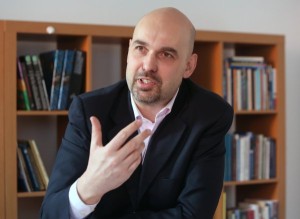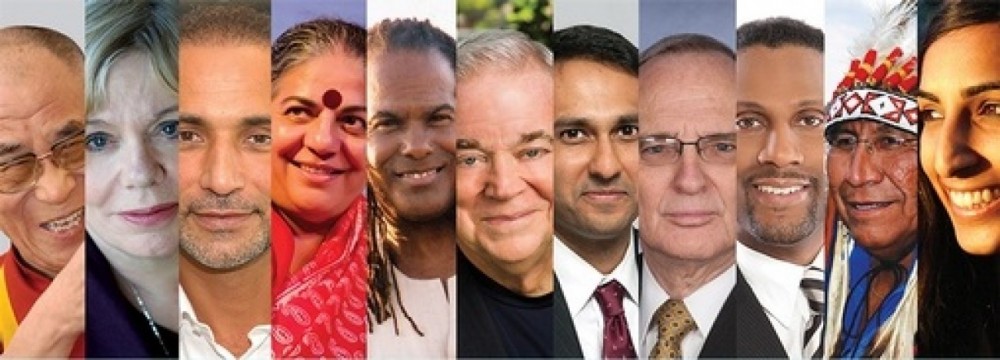New Event: Jews, Christians, Muslims: What Unites Us, What Drives Us Apart?
Slovakia Wants to Host a Prestigious Gathering of Global Leaders
 In an interview for Hospodárske noviny Mário Nicolini addresses the security situation in Europe and Slovakia´s candidacy to host the Parliament of World´s Religions in 2017.
In an interview for Hospodárske noviny Mário Nicolini addresses the security situation in Europe and Slovakia´s candidacy to host the Parliament of World´s Religions in 2017.
When we were looking for a date of our meeting you mentioned that soon you were going to a NATO meeting. The topics will be security and religion. Can you be more specific? Is it about the Middle East?
The meeting will cover broader issues. At the end of January, NATO convened a meeting of experts from both sides of the Atlantic, the Black Sea and the Balkans; not only politicians but also spiritual and religious leaders.
And the meeting is hosted by NATO?
Yes. It is a question of security and peaceful development and how representatives of religious communities and civil society leaders can contribute. There is usually a wide range of processes preceding open conflict. At that time the conflict can still be prevented. And there is space for religion as well. Churches should promote peace and peaceful coexistence.
Please provide an example.
In the Balkans, Miloševič´s regime fanned the flames of nationalism and tried to misuse the not always clear attitudes of the Serbian Orthodox Church. But before the outbreak of the war itself, a long time had passed during which the conflict could have been prevented. The situation in today´s Russia is similar. Through the Orthodox Church, Mr Putin´s regime is trying to enter the internal politics of other countries such as Montenegro. And there is another question: what happens when weapons become silent? Then peace needs to be won. And that is what troops cannot do. They can create a stable and secure environment after the war and open the oxygen for prosperity. But to achieve reconciliation, close wounds and foster reconstruction – that must be done by others, including by religious leaders. This is still a matter to be resolved in Kosovo, for example.
Is religious dialogue a purview of a military-defense community?
NATO certainly will not mediate religious dialogue; that is an agenda of other organizations. This is about mutual acquaintance, about first contacts. It´s a long way. As far as I know, this is the first time that a similar initiative occurs at NATO HQ. I am not talking about operations in Afghanistan where it is common for commanders to communicate with tribal chieftains or spiritual leaders.
This I understand, but why at NATO?
Dialogue about the sources of today´s radicalization and violence must take place on all possible levels. Let us not forget that NATO was established to protect our civilizational values. Military force is not enough. That is a starting point. The upcoming meeting will try to find common basic principles for the protection of the value system running through our societies. Pluralism, freedom of religion. Democracy as the best system of resolving conflicts peacefully.
You are working on something similar in Slovakia. You are preparing to organize a meeting of the Parliament of the World´s Religions in Bratislava. What could it bring?
First of all, the Parliament is not a theological conference. These meetings aim to find ways to resolve the world’s acute problems. There were three dominant topics at the Salt Lake Parliament: global warming, poverty and hate speech, terrorism and religiously motivated violence. In addition, the Salt Lake Parliament addressed the dignity of women, the empowerment of young leaders and the rights of indigenous peoples. By hosting a Parliament of the World’s Religions, Slovakia can get onto the map of the spiritual world. And there is the issue of migration, which is so acute both in Europe and in this country. The way out urgently requires interreligious understanding.
Isn´t it an academic debate? Has the Parliament brought anything specific?
In 2009 the Parliament met in Melbourne on which occasion the Australian government apologized to the indigenous Aboriginal population for the oppression of the past. Another meeting formed a basis for an interreligious education textbook which is now regarded as an international standard. There are examples how the Parliament has made very practical contributions. But there are also immaterial influences that are diffcult to define and measure.
Which personalities could come to Slovakia?
Nobel Peace Prize laureates and dozens of top personalities from different religions regularly attend the Parliament of the World’s Religions. A frequent participant is the Dalai Lama. The Catholic Church is usually represented by major authorities. The Parliament in Spain was opened by the Archbishop of Barcelona. In Salt Lake, the Vatican’s Envoy to the United Nations, an Apostolic Nuncio, addressed climate change.
And besides spiritual authorities?
The Parliament of the World’s Religions has hosted personalities such as Nelson Mandela, Queen Rania of Jordan, former US President Jimmy Carter and other distinguished leaders. The last event in Salt Lake City welcomed around 10,500 participants.
Does Bratislava have sufficient capacities for a similar event?
It certainly has. The Parliament´s representatives share the same opinion. They were here in March. Furthermore, we are preparing the Parliament as a trilateral, Central European project. There are not many projects based in Bratislava with significant side events in Vienna and Prague.
What are the chances that it will be here? What plays in favor of Bratislava?
We are close. We have already addressed many institutions for cooperation. It is particularly interesting for the Council for a Parliament of the World’s Religions to take the event to a post-socialist country. That would be unprecedented. The event would highlight the amazing transformative story of Slovakia from totalitarianism and religious and political oppression towards a pluralistic, democratic, open society.
Shall we manage to build such a society by 2017?
An open society is emerging gradually. There are already things we can be clearly proud of. Although it´s a thorny path. A Bratislava Forum of the Parliament of the World’s Religions can help. In all countries, it was a major transformative event.
Well, the socialist past as an asset is a bit too little…
We have a diverse range of religious communities that coexist with the dominant Catholic Church. They have their leaders, believers and projects. And we already engage them in various events.
The Muslims in Slovakia, on the other hand, can probably hardly speak of a pleasant coexistence.
In connection with the refugees there are strong manifestations of intolerance in this country. It can be explained by the nation´s 40 years of isolation from the world. The Communists crowded religion out from public space. However, the mere fact that something is explainable does not make it excusable. There is no other way than to prepare for the integration of such migrant communities. I am a security expert and I do not underestimate the risks. But these are individual cases which must be dealt with by the intelligence and police.
Who is involved in the preparatory work?
We are co-organizers in a network of various institutions – state, local, religious communities, civic associations. We collaborate with academic institutions as well as businesses. All those who share these values are welcome to cooperate.
Author: Tomáš Ferenčák
The full interview can be found on the website of Hospodárske noviny.
